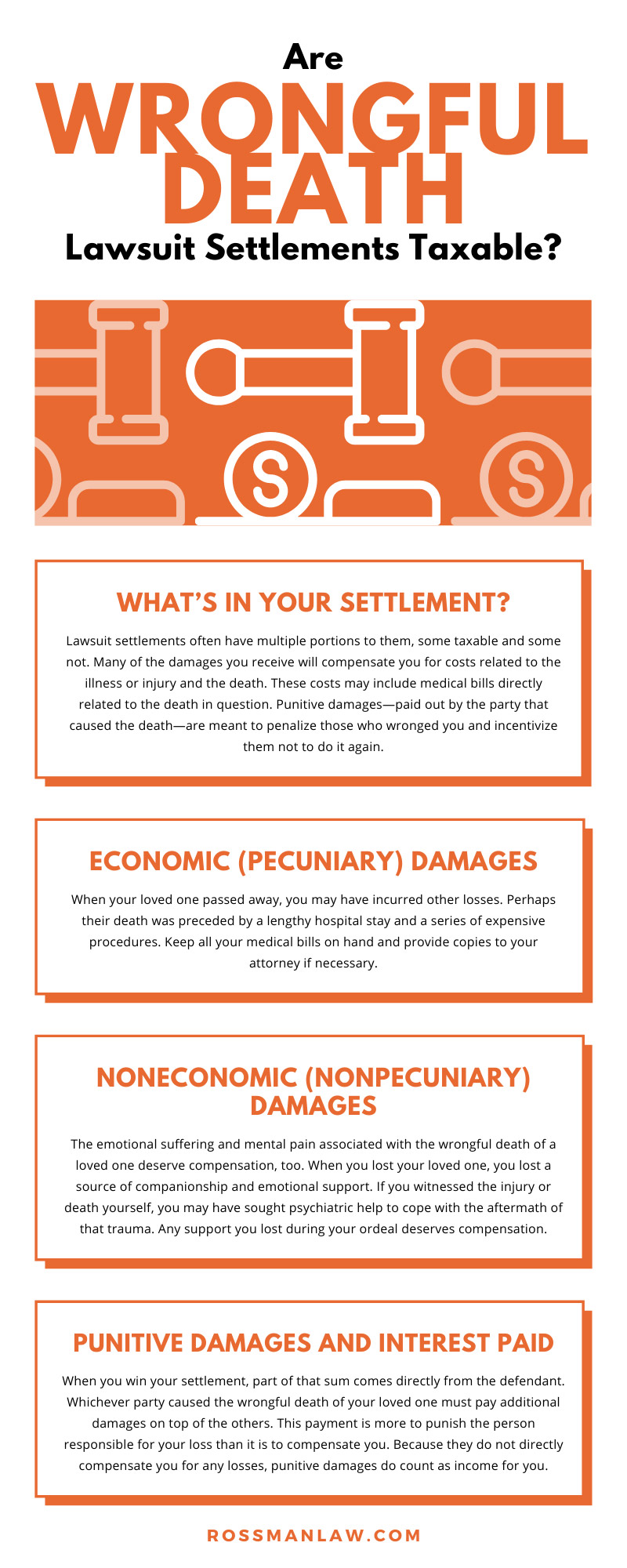
Are Medical Malpractice Settlements Taxable?
August 16, 2021
5 Important Employment Laws To Know in Idaho
August 24, 2021The death of a loved one is always difficult to bear, especially when their death occurred under wrongful, negligent circumstances. Once you’ve gone through the lawsuit process and received your settlement, you’ve got a quandary on your hands: Where does the money go? Do you get to keep all of it, or must you pay taxes on all or part of it? If you’re in the Boise area, Rossman Law Group can guide you not only through the lawsuit but also the settlement process. As you spread out your paperwork and dig through the numbers, let us help you make sense of them. A good injury attorney in Boise, Idaho, will also have extensive experience with wrongful death suits. When you learn whether wrongful death lawsuit settlements are taxable, you’ll be doubly prepared come tax season. Let’s answer this question once and for all.
What’s in Your Settlement?
Lawsuit settlements often have multiple portions to them, some taxable and some not. Many of the damages you receive will compensate you for costs related to the illness or injury and the death. These costs may include medical bills directly related to the death in question. Punitive damages—paid out by the party that caused the death—are meant to penalize those who wronged you and incentivize them not to do it again.
Think of your settlement in three main parts. Economic (pecuniary) damages are tangible and quantifiable; these payments compensate for costs directly related to the wrongful death. Noneconomic (nonpecuniary) damages compensate for emotional pain and mental anguish, often called “pain and suffering.” Finally, the responsible party pays out punitive damages and interest, which is designed to punish them for the wrongful death.
Economic (Pecuniary) Damages
When your loved one passed away, you may have incurred other losses. Perhaps their death was preceded by a lengthy hospital stay and a series of expensive procedures. Keep all your medical bills on hand and provide copies to your attorney if necessary.
If your loved one was a contributing member of your household, you have likely lost a great deal of income, too. These pecuniary damages will directly affect your life going forward. Keep in touch with that loved one’s place of work and calculate how much income you’re now missing.
Funeral expenses, too, can put a dent in your budget. No matter which option you choose—a coffin and a burial plot or a cremation and an urn—putting your loved one to rest can be costly. Keep a record of every penny you spend related to your loved one’s wrongful death.
The Internal Revenue Service (IRS) does not consider compensation for these expenses taxable income. If your settlement includes compensation for quantifiable costs such as medical bills and funeral expenses, you do not need to claim that compensation as income.
There is an exception to this rule: if you have been deducting these costs from your taxes while your lawsuit is in progress, they are taxable. Consult your attorney for advice on how to handle these costs during your lawsuit.
Noneconomic (Nonpecuniary) Damages
The emotional suffering and mental pain associated with the wrongful death of a loved one deserve compensation, too. When you lost your loved one, you lost a source of companionship and emotional support. If you witnessed the injury or death yourself, you may have sought psychiatric help to cope with the aftermath of that trauma. Any support you lost during your ordeal deserves compensation.
Compensation for emotional damages directly related to the wrongful illness and death of your loved one are not taxable income. When the judge awards you your settlement, sit down with your attorney and learn about your pecuniary and nonpecuniary damages. You should not be paying taxes on money awarded to you for the pain and suffering related to your loved one’s wrongful death.
The same exception that applies to pecuniary damages also applies to nonpecuniary damages: if you have been deducting costs related to your emotional suffering on past tax forms, you do need to claim it as taxable income once you get your settlement. In addition, if part of your settlement compensates you for emotional damages unrelated to the wrongful death, that portion must be taxed as well. The paper trail you leave for yourself will be crucial when tax season comes around.
Punitive Damages and Interest Paid
When you win your settlement, part of that sum comes directly from the defendant. Whichever party caused the wrongful death of your loved one must pay additional damages on top of the others. This payment is more to punish the person responsible for your loss than it is to compensate you. (That compensation is divided between the pecuniary and nonpecuniary damages mentioned above.) Because they do not directly compensate you for any losses, punitive damages do count as income for you. A good injury attorney in Boise, Idaho, will spot those punitive damages for you so that you can claim them as income on your taxes.
The lawsuit process can be a lengthy one, and that extra time could add up to a larger settlement for you. A judge can order the defendant to pay interest for the time between the date you made them aware of the lawsuit and the date you reach a settlement. Work with the judge and your attorney to ascertain just how much interest the defendant paid you, because that interest is taxable. Any money you receive in your settlement that does not compensate you for losses counts as income. Claim it on your taxes as such.
When your loved one passes away due to reckless or otherwise negligent circumstances, a wrongful death lawsuit can compensate you for your pain and suffering. Rossman Law Group is in your corner for the entire process and has the knowledge you need to properly file your taxes going forward. When you’ve gathered witnesses and evidence and you’re ready to file that lawsuit, give us a call. We can answer the question: Are wrongful death lawsuit settlements taxable? That answer is yes, and our expert guidance can win you the settlement you deserve and help you pore through your finances as you go. A little extra tax savvy goes a long way to compensate you for your losses.






